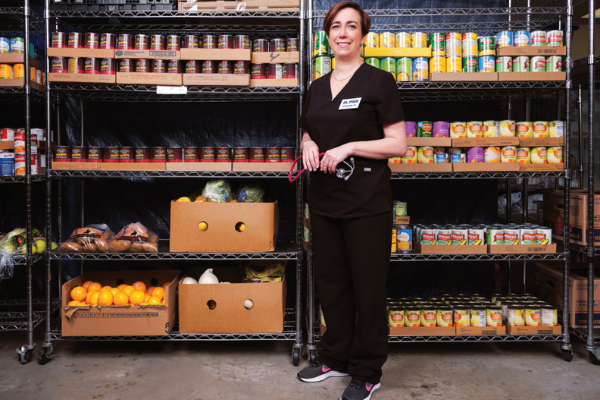
This is the latest in a Texas Medicine Today series of TMA member profiles showing how COVID-19 has shaped Texas physicians, their patients, and the practice of medicine. Have a story to share? Email joey.berlin@texmed.org.
Tyler pediatrician Valerie Smith, MD, is hard-wired to look at the bright side, even when considering the mental and behavioral health consequences of the ongoing COVID-19 pandemic.
“There have been really tangible, good things that have come out of COVID, which has forced us to think about things from a different perspective,” she said. “I always like to find the silver lining.”
Over the past two years, for instance, many children and adolescents have suffered psychologically due to the pandemic and other disruptions. Between mid-March and October 2020, mental health emergency department visits increased 24% for children aged 5 to 11, and 31% for those aged 12 to 17 compared with the same period in 2019, according to the Centers for Disease Control and Prevention. In the fall of 2021, the American Academy of Pediatrics, the American Academy of Child and Adolescent Psychiatry, and the Children’s Hospital Association declared a “national state of emergency” in children’s mental health.
Dr. Smith has seen this uptick firsthand at her small, low-cost practice. Many of her preteen and teenaged patients have struggled with anxiety and depression as a result of intermittent school closures, which simultaneously heighten their symptoms and upend their support systems.
However, amid all of this, plus a shortage of pediatric psychiatrists in East Texas and across the state, Dr. Smith says she has grown more experienced in and adept at caring for such patients, whom she expects to treat long after the pandemic. “We as physicians will see the residual effects … in the realm of children’s mental health for the next decade,” she said.
Since the onset of the pandemic, her practice, St. Paul’s Children’s Services, has hired two clinical social workers to help meet this growing demand – and relieve some of the pressure on Dr. Smith.
“Having that integrated behavioral health piece allows me not to have to carry that whole burden alone at work,” she said.
Similarly, the pandemic has exposed some uncomfortable truths about the health care industry and exacerbated some of its long-standing problems, such as workforce shortages and physician burnout.
“It’s been really hard for myself and other physicians … to recognize that we have been willing to make sacrifices to help our health systems and, recently, to recognize that it often isn’t valued, and that our health and well-being are not often a priority for the systems we work for,” she said.
Dr. Smith feels fortunate to work for a small, faith-based nonprofit that has committed to supporting her and her colleagues. But she says this is the exception, not the rule, in medicine.
To her point, the health care sector lost nearly half a million workers between February 2020 and October 2021, according to the U.S. Bureau of Labor Statistics. A September 2021 poll of 1,000 health care professionals by the data intelligence company Morning Consult found 19% of respondents who had stayed in their jobs since mid-February 2020 had considered leaving the industry altogether.
Against this backdrop, Dr. Smith says she’s developed a commitment to improving her profession. During the pandemic, she has found solace in advocacy as a member of the Texas Medical Association’s COVID-19 Task Force and chair of its School Reopening Workgroup
“Because I am in a small practice … having this connection to other physicians across the state and hearing that they’re having some of the same problems … has been really vital to not feeling so isolated,” she said.
In addition to this camaraderie, Dr. Smith has found some cause to feel optimistic.
“My future hopefully won’t involve being on the COVID task force forever, but I hope to be involved in TMA in a capacity where I can help make meaningful change,” she said.
Emma Freer
Associate Editor
(512) 370-1383